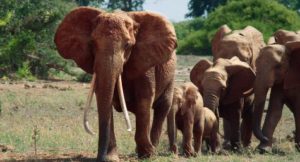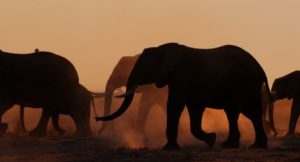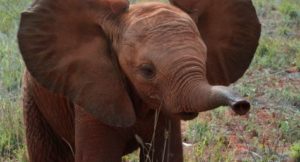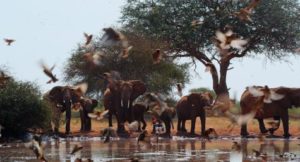The Elephant Queen is a documentary directed by Mark Deeble and Victoria Stone with Academy Award nominee Chiwetel Ejiofor serving as the story voice-over narrator. The film follows elder matriarch Athena, who is responsible to protect her elephant herd after they are forced to leave their waterhole from a drought and take an epic journey across the African savannah. One specific family within the herd focuses on mother Mala and her three children of oldest daughter Milli, naughty middle son Wewe, and newborn Mimi.
This becomes a tale of struggle as Mimi must endure the entire voyage. Other side characters featured along the ride includes birds, dung beetles, chameleons, bullfrogs, killifish, and terrapins. The two directors had reached out to composer Alex Heffes and believed he could capture the heart of Africa by scoring it as if it were a movie.

The composition in the documentary matches that of an animation or movie with a storyline. Heffes clarified, “The main difference when doing a nature film is even when there’s voice-over; the main characters, the animals, they don’t speak and there’s no particular script. When we’re scoring nature films or documentary, we have to figure out what is going on, without music and without voice-over. I needed to learn to speak elephant a little bit to decode what I was watching to translate that into something that would make sense for audiences. After watching it for a long time, I was tuning in to some of the little nuances of behavior that I was seeing.”
The score balanced tones with heavy traumatic emotion mixed in with a bit of lightheartedness. “Sometimes people are worried that movies about elephants are going to get heavy and emotionally traumatic because they know that they’re poached and endangered. It was important for me to find a balance in the music between having some serious emotion. When there’s a drought and when the elephants are in danger, it’s a heavy emotion. Also have plenty of lightness of fun, comedy, and uplifting moods as well, so that we come away having enjoyed the whole spectrum of emotion.”

“The film takes an interesting turn around the middle way. First of all, sets up all these different characters, it’s fun, and there’s lots messing around. Then the film gets really emotional when we realize it’s actually a family story. When Athena, the mother elephant has to make important decisions such as deciding to lead the whole family back out into the wilderness in the middle of a drought because their waterhole has dried up. We can see the real-life dilemmas that these creatures have to face. I was trying to understand what that emotion would be like for people as well and translating that into music so that the audience can understand the family story,” the composer considered.
Creating a score for baby elephant who gets sick can be a very challenging and a difficult task. “It’s challenging writing music for something that is very sad. We’ve got to pick up on the sadness and the tragedy of it. We can’t go so far that it just becomes unwatchable and unbearable. We need to try to find something in it, a ray of hope, a ray of humanity, or something humane about it. For that strand, the storyline was very hard to score to find that balance. Even though it’s a very sad scenario, I’ve seen audiences being picked up by the next bit of music that comes in, picking them up and moving them on,” the composer voiced.

It’s not just about the elephants, the other side characters also had their own themes. Heffes added, “The dung beetle is almost in a western. He gets attacked by some other dung beetles and they have a face off. We recorded “Ride of the Valkyries” at one point when the dung beetle takes off. This chameleon moves in slow motion like a cartoon character. The birds have got their own thing.”
Many types of African instruments were used in the creation of the score. The composer described, “Lots of fun pianos from different places in Africa, one that’s made out of a sardine can. I’ve got lots of shakers that are made out of seeds and gourds. In the orchestra, we had 70 people all playing different instruments. We used a lot of different percussion and the mbira. We used banjo for the turtle, electric guitar for Wewe, and various types of African flutes for the vocals. We had wonderful African singers as well.”

“One of my favorite moments is when the rains finally come and everyone is essentially rescued because water is the giver of life. The build up to the storm, the heavens opening, the water coming down, and it being this wonderful rebirth. That’s on the album, it’s called “Rain Song & Awoken by the Rain.” It’s a wonderful refreshing moment where life is brought back again.”
 Composer Alex Heffes is a past winner of the Hollywood Music In Media Awards (HMMA), World Soundtrack Awards, Ivor Novello Awards, and is a two-time champion for the ASCAP Film and Television Music Awards. The Elephant Queen has been nominated for the Hollywood Music In Media Awards (HMMA) in the category of Best Original Score – Documentary. The Official Motion Picture Soundtrack comprises of 29 original pieces composed by Alex Heffes.
Composer Alex Heffes is a past winner of the Hollywood Music In Media Awards (HMMA), World Soundtrack Awards, Ivor Novello Awards, and is a two-time champion for the ASCAP Film and Television Music Awards. The Elephant Queen has been nominated for the Hollywood Music In Media Awards (HMMA) in the category of Best Original Score – Documentary. The Official Motion Picture Soundtrack comprises of 29 original pieces composed by Alex Heffes.





